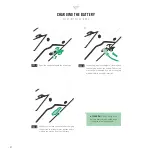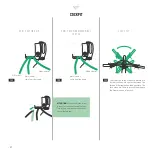
y t
2 9
EN
YOU CAN FIND DETAILLED
INFORMATION ABOUT
YOUR BIKE IN YOUR
„SAFETY FIRST.“
HANDBOOK
O U T S I D E O F G E R M A N Y
Please inquire about the respective regulations for
each country in which you want to ride your YT Bike
on public roads.
D E S I G N A T E D U S E
In addition to the assembly instructions, our moun-
tain bikes are also supplied with the operating
instructions from the manufacturers of the indi-
vidual components. You can find all information
regarding use, maintenance, and care here. Please
follow these instructions and retain them. Damage
that arises from improper or inappropriate use of
your YT are not covered by our warranty.
These include:
•
Improper or inadequate maintenance and care.
•
Damage from crashes or overstressing.
•
Modification to the frame or fork.
•
Modification of components.
•
Jumps or other stresses that lead to overstraining.
Please refer to our General Terms and Conditions at
www.yt-industries.com.
I M P O R TA N T G E N E R A L I N F O R M A T I O N
We are not liable for property damage or personal
injury resulting from the operation of the mountain
bike itself, in particular, in the event of failures due to
inadequate maintenance and care.
The abilities of professional mountain bikers may
seem easy to imitate to laypersons. In reality, there
are often years of training and constant practice
behind their skills. For your safety, always wear pro-
tective clothing appropriate for the discipline.
We recommend always wearing a protective helmet.
Things always seem to happen when you least
expect them.
C A R E A N D S E R V I C E I N T E R VA L S
Only regular inspections, care and maintenance,
immediate professional repair, and the replacement
of damaged components can guarantee the safe
function of your bike over the long term. If you do
not possess the necessary specialist knowledge or
tools to carry out the required work yourself, a trip
to the workshop is essential. For guidance, we have
prepared some maintenance information:
We recommend an initial inspection, depending on
how hard you ride, after 5 to 15 hours of operation.
This includes:
•
Checking the torques on all screws and nuts and
tightening them if necessary.
•
Changing the length of the shifter cable by
correcting the tension via adjustment (barrel
adjuster on the shifter).
•
Checking the spoke tension on the wheels and that
the wheels are true and adjusting spoke tension if
necessary.
•
Checking the headset preload and gently readjust
if necessary.
M O N T H LY I N S P E C T I O N S
•
Checking the profile height and sidewalls of the
tires. Replacing worn or ″washed out″ tires.
•
Measuring the strength of the disc brake pads.
Replacing the brake pads if necessary (please note
the manufacturer specifications).
•
Checking the braking system for leaks. In the event
of leaks, please visit a specialist workshop.
•
Checking bearing play in the bottom bracket, head
set, hubs, and pedals and tightening if necessary.
•
Checking the spoke tension on the wheels and that
the wheels are true and adjusting spoke tension if
necessary.
•
Checking the torques on screws and nuts. If neces
sary, tightening screws and nuts.
•
Cleaning and greasing the drivetrain and derailleur
mechanism.
A N N U A L I N S P E C T I O N S
•
Suspension fork service: Please note the
specifications of the manufacturer here.
•
Remove the bottom bracket, clean it, and regrease
the treads.
•
Remove the headset, check the bearings and
regrease them.
•
Remove the stem, handlebar, and seatpost and
check them for cracks and damage and replace
them if necessary.
•
Check the shifter cable for damage (breaks, kinks,
corrosion, etc.) and exchange them if necessary.
ADJUSTMENTS
AFTER ASSEMBLY
















































